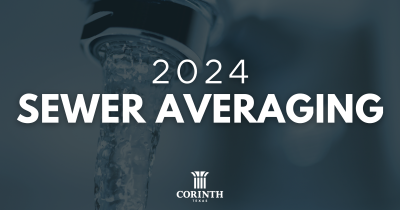2024 SEWER AVERAGING
CORINTH, TX, November 5, 2024 – Interested in reducing your water bill? Each year during late fall and winter, residential water usage is measured and averaged to determine sewer charges for the upcoming year. This process takes place from November to February when outdoor water demand is typically low.
What is Sewer Averaging?
While your water meter records your monthly usage, there’s no meter for wastewater sent to the sewer system. Averaging your water usage during the fall and winter helps determine your wastewater charge.
Sewer averaging is a method used to estimate the volume of wastewater entering the sewer system by averaging your water usage over a defined period. This method ensures fair sewer billing by reflecting the actual amount of water likely to be treated as sewage.
How It Works:
- Measurement Period: Water usage is measured over four consecutive months beginning in November to February.
- Averaging Calculation: The month with the highest usage is excluded, and the remaining three months are averaged to establish your average consumption.
- Rate Application: This average water usage is applied to determine sewer charges for the billing cycle starting in April.
Why Sewer Averaging Matters:
- Accurate Billing: Late fall and winter coincide with decreased water consumption, as many households reduce irrigation and outdoor water activities. By using average water usage, sewer charges are aligned with actual indoor water consumption, leading to more equitable billing.
- Stable Costs: Since your wastewater average is calculated during your lowest water usage period, you’ll receive a fixed monthly wastewater fee that won’t increase, regardless of your water usage for the rest of the year. This method helps stabilize sewer bills by avoiding seasonal spikes in water usage, providing customers with predictable sewer expenses.
Customer Tips for Managing Sewer Charges:
- Conserve Water: Reduce water use during the sewer averaging period. Actions like shorter showers, fixing leaks, and using water-efficient fixtures can lower average consumption.
- Check for Leaks: Inspect plumbing for leaks that could increase water usage and affect sewer rates.
- Monitor Usage: Regularly review your water usage to stay informed and make adjustments as needed.
For questions regarding sewer averaging, please contact Utility Customer Service at (940) 498-3200 option 3.

